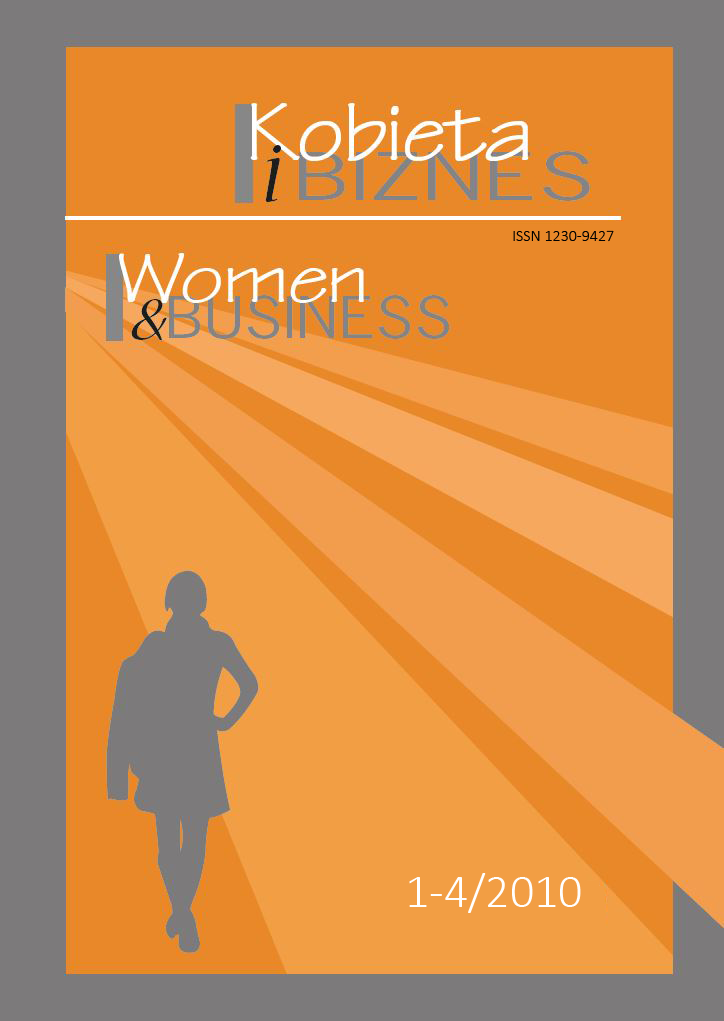Determinants of professional career of women in Turkey
Main Article Content
Abstract
The presented surveys results showed that occupational position of Turkish women is the result of both types of determinants: external (culture organizational, stereotypes concerning women functioning in the society), and internal (attitudes of women and their close environment). On the one hand, Turkish companies present understanding of women's family related needs, but on the other hand, traditional way of thinking favours men in advancement to higher positions. Women worldwide share many problems faced by Turkish women. They are often perceived through the lenses of physical attractiveness, instead of competences or required assumption of the "masculine" way of functioning in the organization. The existence of diffi culties does not men though that women cannot succeed in their professional careers. Increasingly more Turkish women hold high, responsible positions. Worth to notice is the fact that their mutual characteristic features are self-confi - dence, self-dependence, and determination in achieving assumed goals. If a woman believes in her capabilities, she will easily win over her subordinates, superiors and business partners. The attitudes of the successful Turkish women go beyond stereotypical beliefs, they show that it is possible to combine family life with professional career, be a good wife, mother and businesswoman.
Article Details
Authors retain copyright and grant the journal right of first publication with the work simultaneously licensed under a Creative Commons Attribution License that allows others to share the work with an acknowledgement of the work's authorship and initial publication in this journal. All authors agree for publishing their email adresses, affiliations and short bio statements with their articles during the submission process.
Author agrees to share his work under CC-BY-NC license.
References
2. Arşıray N. Mentoring relationship of women in Turkey, praca magisterska, Institute for Graduate Studies in Social Science, Boğaziçi University, Stambuł, 1991.
3. Aycan Z. Key Success Factors for Women in Management in Turkey, "Applied Psychology: An International Review", nr 53, vol. 3, 2004, s. 459-464.
4. Aycan, Z. Kanungo, R. N. The impacts of national culture on organizational culture and human resources practices, [w:] Management, leadership and human resources practices in Turkey, Z. Aycan (red.), Turkish Psychology Association Press, Ankara 2000, s. 25-53.
5. DPT, Annual Programme, Ankara 2007.
6. Greenhous P. H., Parasuraman S. Job performance attributions and career advancement prospects: An examination of gender and race effects, "Organizational Behavior and Human Decisions Processes", nr 55, 1993, s. 273-297.
7. Güney S., Gohar R., Akıncı S., Akıncı M. Attitudes toward women managers in Turkey and Pakistan, "Journal of International Women's Studies", vol. 8, 1.10.2006, s. 198.
8. Gürbüz, E. A Measurement of Sex-Trait Stereotypes, praca magisterska, Boğaziçi University, Stambuł 1988.
9. Hofstede G. J. Cultural dimensions, http://www.geert-hofstede. com, 15.04.2003.
10. Human Development Report, UNDP Nowy Jork 2008, s. 341.
11. Kabasakal H. A profi le of top women managers in Turkey, [w:] Deconstructing images of the Turkish women, Z. F. Arat (red.), Palgrave, Nowy Jork 1999, s. 225-240.
12. Kabasakal H. , Boyacigiller N. , Erden D. Organizational Characteristics as Correlates of Women in Middle and Top Management, "Boğaziçi Journal: Review of Social, Economic and Administrative Studies", nr 8, 1994, s. 47-48.
13. Kardam F., Toksöz G., Gender based discrimination at work in Turkey: Cross-sectoral overview, "Journal of the Faculty of Political Sciences", Ankara University 2004, nr 4, s. 6.
14. KSGM, Gender Equality National Action Plan 2008-2013, Ankara 2008, s. 25.
15. Özbilgin M. F., Tatlı A., Küskü F. Gendered occupational outcomes: the case of professional training and work in Turkey, [w:] Explaining gendered occupational outcomes, J. Eccles, H. Watt (red.), American Psychological Association Press, Michigan 2008, s. 23.
16. ÖSYM, Higher Education Statistics, Ankara 2000.
17. Sakalli-Ugurlu N., Beydogan B., Turkish college students' attitudes toward women managers: the effects of patriarchy, sexism and gender differences, "The Journal of Psychology", vol. 136, nr 6, 2002, s. 647-656.
18. Staines G., Travis C., Jayerante T.E., The queen bee syndrome, "Psychology Today", nr 7, vol. 8, 1973, s. 57.
19. Taylor S., Napier N., An American Women in Turkey: Adventures Unexpected and Knowledge Unplanned, "Human Resources Management" 2001, nr 40, vol.
20. TBB, Banks, Branches and Employees Statistical Report, Stambuł 2004.
21. Toksöz G., Women's employment situation in Turkey, International Labour Organisation, Ankara 2007, s. 43.
22. TÜIK, Household Labour Force Survey (HLFS), 2006, s. 36.
23. Ufuk H., Özgen Ö., The profi le of women entrepreneurs: a sample from Turkey, "International Journal of Consumer Studies", nr 25, 4.12.2001, s. 301-302.
24. Woodward D., Özbilgin M. F., Banking and gender: Sex equality in banking in Turkey and Britain, IB Tauris, Londyn 2003.
25. Woodward D., Özbilgin M. F., Sex equality in fi nancial services sector in Turkey and the UK, "Women in Management Review", nr 8, vol. 14, 1999, s. 329.
26. Yetim N., Yetim U., The cultural orientations of entrepreneurs and employee's job satisfaction: The Turkish small and medium sized enterprises (SMEs) cases, "Social Indicators Research", nr 77, 2006, s. 272.
27. Zeytinoğlu I. U., Constructed images as employment restrictions: Determinants of female labour in Turkey, [w:] Deconstructing images of the Turkish woman, Z. F. Arat (red.), Palgrave, Nowy Jork 1999, s. 183-197.

